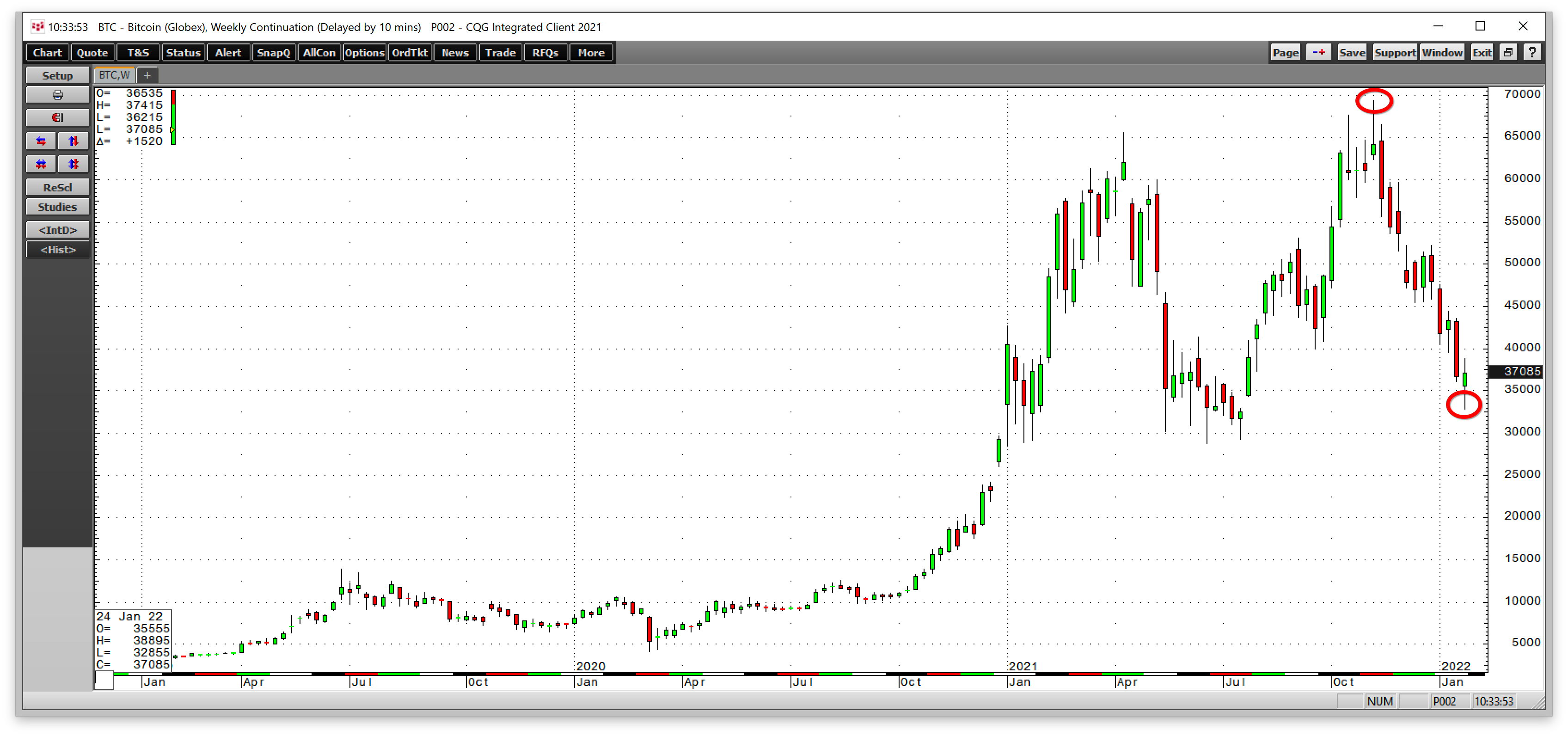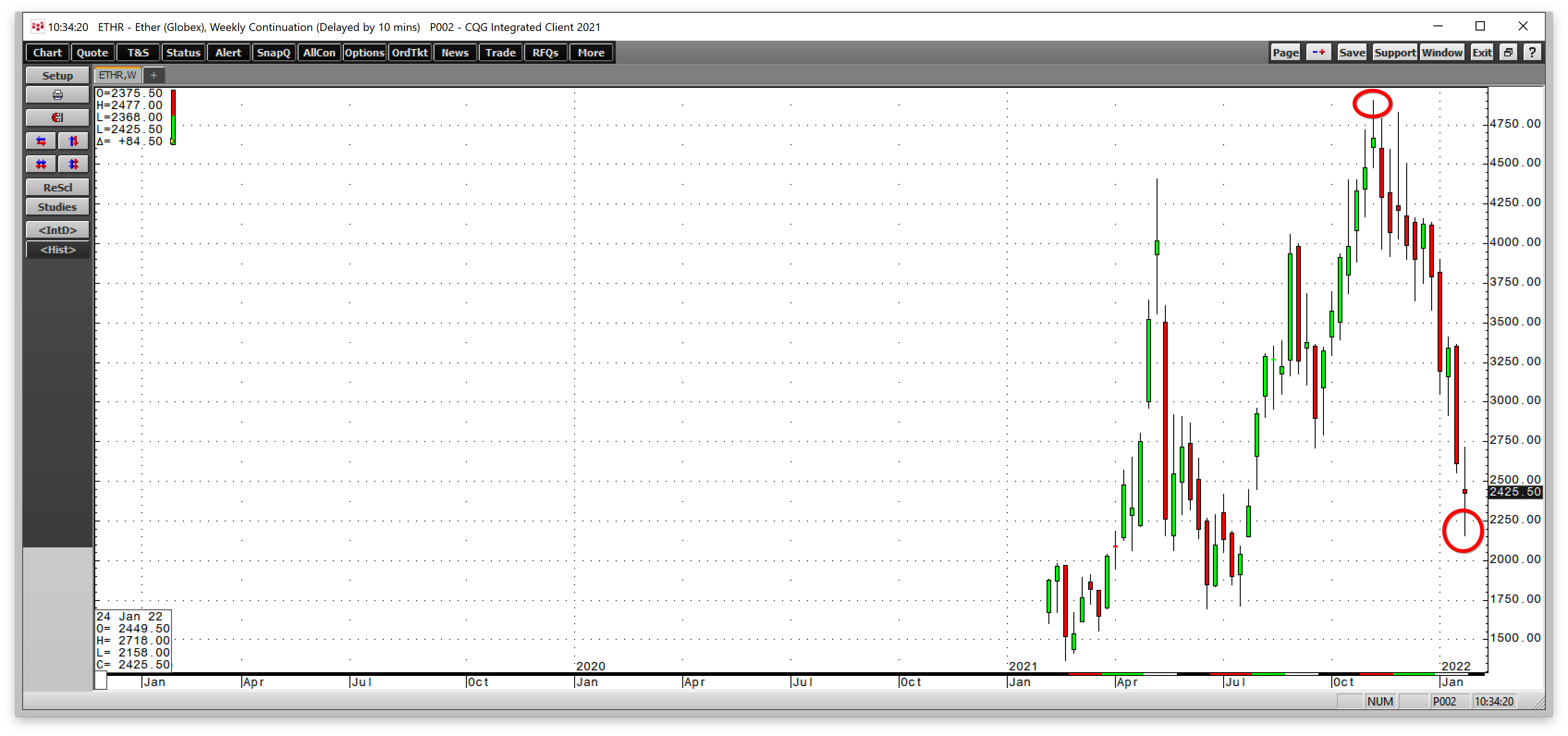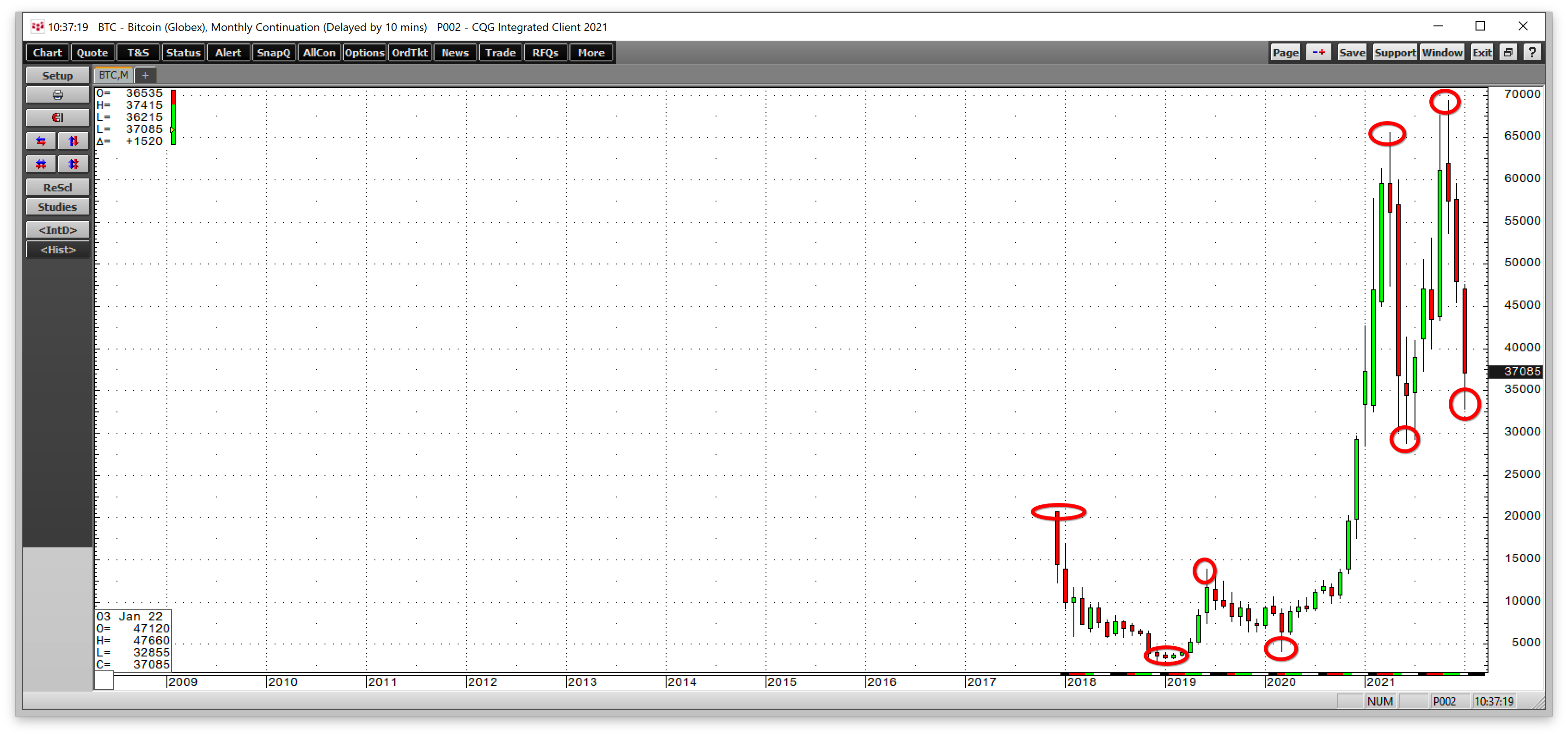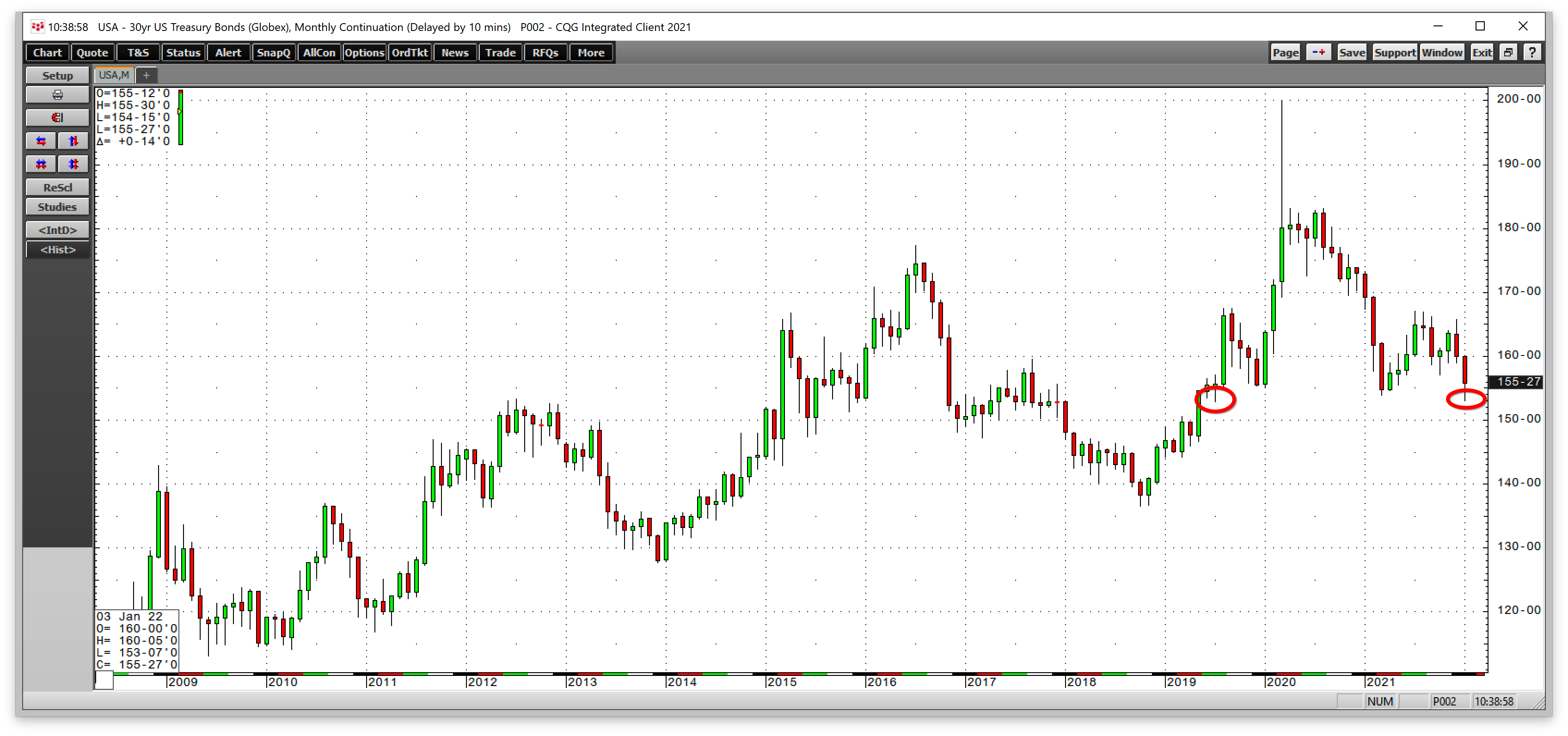This article was written exclusively for Investing.com
- Cryptocurrency devotees watch as values melted
- Regulators could not be more pleased
- We've been here before
- Fiat currencies offering higher interest rates could be crushing cryptos
- Gold has outperformed the burgeoning asset class
In early November 2021, when Bitcoin and Ethereum were heading for the all-time highs they touched on Nov. 10, crypto bulls were calling for the price of Bitcoin to reach $100,000 per token by the end of the year. Had that occurred, it would have put BTC's market cap at the $3 trillion level.
However, the bullish music halted abruptly on Nov. 10 when Bitcoin and Ethereum reached record highs then reversed, to close at lower prices than the previous session. At first, digital currency devotees viewed the price action as just another bout of profit-taking, and continued to expect the volatile cryptos to resume their ascent.
But, Bitcoin and Ethereum never looked back. The two tokens fell, making lower highs and lower lows through late January. Last week, they dropped to even lower lows as selling continued to grip the stock market.
Some analysts began calling Bitcoin, Ethereum, and other cryptos inflation hedges last year as they rose with the consumer and producer price indices. They even went as far as saying that gold is a dead asset, replaced by the burgeoning cryptocurrency asset class.
Yet, in early 2022, gold has sparkled while cryptos continue to fade. After years of outperformance, in January of this year, cryptos have done a lot worse than the yellow metal.
It's still too early to tell if the trend will continue, but gold has historically been a far more stable asset than cryptos. Plus, an influential group of governments and traditional bankers would like to see cryptocurrencies evaporate into the economic history books in 2022.
Cryptocurrency devotees watched as values melted
Since the Nov. 10 all-time high, the price action in cryptocurrencies has been ugly. On that day, Bitcoin and Ethereum futures put in bearish key reversal patterns on the daily charts as the price rose to a new high and closed below the previous day’s low. A bearish reversal can lead to a correction in markets; in cryptos, it led to carnage. 
Source: CQG
The weekly chart shows the drop from $69,355 per token in mid-November to the most recent low of $32,855 last week. Bitcoin futures lost more than half their value, with a 52.6% decline from the high to the low. The leading crypto was sitting at the $37,000 level on Jan. 28, while at time of publication on Jan. 31 it's hovering just above $37K. The price action in Ethereum futures was slightly uglier. 
Source: CQG
Ethereum collapsed from $4,902.75 on the January futures contract to a low of $2,158 last week, a 56% drop. Currently at the $2,425 level, Ethereum is sitting not far from its recent low.
Regulators could not be more pleased
As cryptocurrency prices took off last year, and the asset class's market cap jumped to the $2.6 trillion level, with the possibility in mid-November the overall market valuation would hit $3 trillion or beyond, government regulators and officials worldwide watched passively, like deer caught in the headlights. They're likely extremely relieved right now as the crypto-sphere's overall value has plummeted; it stood at the $1.73 trillion level at the end of last week.
The decline in market cap and fall in Bitcoin, Ethereum, and many other cryptocurrency prices, has dampened the speculative frenzy, allowing regulators time to consider how they will approach the asset class. With Russia in the crosshairs of the US and NATO, Moscow's plan is to restrict cryptocurrencies; China has already officially curtailed cryptocurrency activity.
The decline in cryptos in late 2021 and early 2022 gives the US and European regulators more time to consider how to regulate the asset class that threatens their control of the money supply when it begins to rise again.
We've been here before
Cryptos have been volatile in recent years. As such, the latest decline should come as no surprise.
Bull markets rarely move in straight lines, and corrections in the most volatile and illiquid assets are often ugly. Lumber Futures fell from an all-time high of over $1,700 per 1,000 board feet in May 2021 to a low of $488 in August 2021, before returning to over the $1,170 level at the end of 2021 and over $1,300 in early 2022 before returning to the $1,000 level.
When it comes to price variance, Bitcoin has an illustrious past. 
Source: CQG
The chart shows the explosive rallies and implosive corrections that took Bitcoin from:
- A high of $20,650 in December 2017 to a low of $3,120 in December 2018.
- A rally to $13,915 in June 2019 led to a correction to $4,120 in March 2020.
- The explosion that propelled Bitcoin to $65,520 in April 2021 led to a drop to $28,800 in June 2021.
- The last peak at $69,355 in mid-November 2021 ended with a correction that has so far taken it to a low of $32,855 as of last week.
Anyone surprised by the recent price action needs only to look back at the volatile history of Bitcoin over the past four years.
Fiat currencies offering higher interest rates could be crushing cryptos
The US Federal Reserve has declared it is prepared to address rising inflationary pressure by tightening monetary policy. Quantitative easing will become tightening over the coming months as the Fed reduces its swollen balance sheet.
Liftoff from a zero percent Fed Funds rate is only weeks away, and the US central bank seems ready to hike short-term rates aggressively over the coming months. Other central banks will follow the Fed as the US dollar is the world’s reserve currency. The US 30-year Treasury bond futures recently breached a downside technical level.

Source: CQG
The monthly chart of the long bond futures shows the recent low of 153.07, the lowest level since July 2019. Since bond prices move inversely to yields, long-term rates have been rising.
As fiat currency yields increase, cryptocurrencies must compete with them. Crypto devotees have argued the asset class is an inflation hedge. Nevertheless, since mid-November, the prospects for rising fiat currency interest rates have weighed on crypto values.
Gold has outperformed the burgeoning asset class in 2022
Gold has historically been the leading inflation barometer, but it underperformed the commodity asset class in 2021 as the precious metal’s price declined by 3.51% last year. Nearby COMEX gold futures settled at $1,828.60 per ounce on Dec. 31, 2021.
Meanwhile, Bitcoin was at $47,985 on the final trading day of 2021, and Ethereum was $3,791 per token. The crypto asset class had a market cap of $2.166 billion at the end of 2021.
On Jan. 28, 2022, gold was trading at the $1,784.90 level, 2.4% lower so far in 2022. Bitcoin at $37,085 that day was 22.7% lower, and Ethereum at $2,625 was over 30.7% lower. The asset class’s market cap at the $1.73 trillion level was over 20% lower. Gold has outperformed cryptocurrencies during the first month of 2022.
Keep an eye on gold compared to the cryptos as the argument over which assets are the best inflation hedge is likely to continue to rage over the coming months.
Expect lots of volatility in cryptos, and you will not be disappointed. It is impossible to pick tops or bottoms in any market as bull markets tend to take prices to levels that defy rational, logical, and reasonable analysis on the upside and do the same on the downside.
Remember, on Nov. 10, it seemed like it was just a matter of time before those calling for a $100,000 per token Bitcoin price would be taking a victory lap. Now, $10,000 per token seems to be within reach, which could mean we are closer to the bottom than the top for 2022.
Meanwhile, the long-term bull market in gold that began in 1999 remains intact. At below the $1,800 pivot point, the yellow metal continues to digest the move to the all-time high in August 2020 and consolidate its gains since breaking out to the upside.
